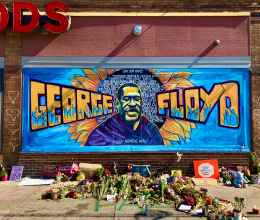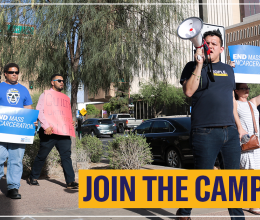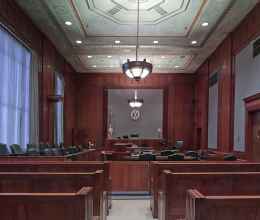
FOR IMMEDIATE RELEASE
PHOENIX – The ACLU today named the three individuals who will serve on the Community Advisory Board that a federal judge created to foster public trust in the MCSO and its reform process. The board will work with the community and court-appointed monitor to gather concerns and provide feedback about MCSO policies and practices. The three-member board includes:
- Lisa Duran, J.D., an attorney with over two decades of experience in the field of immigration law.
- Angeles Maldonado, Ph.D., an organizer who has worked with several prominent immigrants’ rights groups in Arizona.
- Carlos Santos, Ph.D., an assistant professor at Arizona State University who studies the mental health effects of immigration-related policies on young people.
In May 2013, U.S. District Court Judge G. Murray Snow issued a ruling in an ACLU class action lawsuit,Ortega Melendres v. Arpaio, on behalf of Latinos in Maricopa County. Judge Snow determined that MCSO had violated the Fourteenth Amendment of the U.S. Constitution by targeting Latinos for traffic stops and had violated the Fourth Amendment by detaining Latinos without valid legal justification.
Judge Snow then issued a permanent injunction as a remedy for the constitutional violations. This injunction order includes many changes to MCSO policies and practices, appoints an independent monitor to oversee MCSO’s compliance and creates a Community Advisory Board, which will meet three times per year as long as the order is in effect.
According to Judge Snow’s amended injunction, the Community Advisory Board will:
- Facilitate regular dialogue between the monitor, Robert Warshaw, and his team, and leaders of Maricopa County’s Latino communities.
- Provide recommendations about MCSO policies and practices related to the agency’s compliance with the court’s remedy.
- Relay and/or gather concerns from the community about MCSO practices that may violate the provisions of the injunction.
- Transmit community concerns to the monitor for his investigation and/or action.
The monitor will coordinate the Community Advisory Board’s meetings. The first board meeting will be held this summer.
Prior to the first Community Advisory Board meeting, the ACLU will distribute information about a website where community members can learn about the case, read court filings and monitor reports and submit concerns about MCSO activities to the Community Advisory Board.
###

